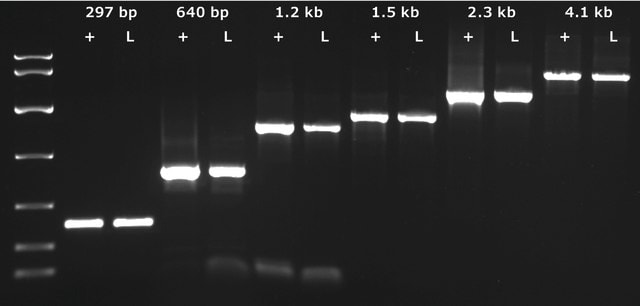2GRHSKB
Roche
KAPA2G Robust HotStart PCR Kit
Synonyme(s) :
PCR kit
About This Item
Produits recommandés
Utilisation
sufficient for 1000 reactions
sufficient for 200 reactions
sufficient for 500 reactions
sufficient for 5000 reactions
Niveau de qualité
Durée de conservation
≤12 mo.
Caractéristiques
Difficult Templates/Specialty Enzymes PCR
dNTPs included: no
hotstart
Conditionnement
pkg of 100 U (KK5522)
pkg of 250 U (KK5515)
pkg of 2500 U (KK5525)
pkg of 500 U (KK5517)
Fabricant/nom de marque
Roche
Technique(s)
PCR: suitable
Entrée
crude DNA
Température de stockage
−20°C
Vous recherchez des produits similaires ? Visite Guide de comparaison des produits
Description générale
Application
- PCR amplification of saliva samples
- PCR amplification for direct sequencing
- Nested PCR
- Amplification of GC- or AT-rich templates
- Templates containing common PCR inhibitors e.g. salts, urea, SDS, or ethanol
- Crude sample PCR e.g. buccal swabs, cultured mammalian, yeast, or bacterial cells
- Colony PCR
- RT-PCR
Actions biochimiques/physiologiques
Caractéristiques et avantages
- Robust performance across a wide range of GC- and AT-rich templates
- Increased PCR success rates
Improved tolerance to common PCR inhibitors
- Efficient amplification from crude samples
- Higher yield and sensitivity per unit of enzyme
Unrivalled performance in colony PCR
- Higher yields and improved consistency of PCR direct from E. coli and yeast cells
Quick Notes:
- KAPA2G Robust HotStart PCR Kits contain KAPA2G Robust HotStart DNA Polymerase, engineered for high processivity and inhibitor tolerance.
- Both purified genomic DNA and crude samples (e.g. colony PCR) can be used as template.
- Use 0.5 U of KAPA2G Robust HotStart DNA Polymerase per 25 μL reaction. More challenging PCRs (GCrich,crude sample) may require higher enzyme concentrations.
- Use 15 sec/kb extension time per cycle, and increase to 30-60 sec/kb for difficult amplicons or templates.
- KAPA2G Buffers contain 1.5 mM MgCl2 at 1X.
- Additional MgCl2 may be added using the 25 mM MgCl2 solution provided in the kit.
- KAPA2G Buffer A is optimized for high yield, specificity, and sensitivity.
- KAPA2G Buffer B is recommended for inhibitorcontaminated template samples.
- KAPA2G GC Buffer is recommended for GC-rich PCR (>70% GC).
- KAPA Enhancer 1 can be used with KAPA2G Buffer A or B, particularly for GC-rich assays.
- Reaction products are 3′-dA-tailed and may be cloned into TA cloning vectors.
Qualité
Notes préparatoires
Autres remarques
Informations légales
Composants de kit seuls
- KAPA2G Robust Standard or HotStart® DNA Polymerase 5 U/μL
- 5X KAPA2G Buffer A
- 5X KAPA2G Buffer B
- 5X KAPA2G GC Buffer with MgCl2
- 5X KAPA Enhancer 1
- MgCl2 25 mM
Mention d'avertissement
Warning
Mentions de danger
Conseils de prudence
Classification des risques
Acute Tox. 4 Oral - Aquatic Chronic 3 - STOT SE 2
Code de la classe de stockage
12 - Non Combustible Liquids
Classe de danger pour l'eau (WGK)
WGK 1
Point d'éclair (°F)
does not flash
Point d'éclair (°C)
does not flash
Certificats d'analyse (COA)
Recherchez un Certificats d'analyse (COA) en saisissant le numéro de lot du produit. Les numéros de lot figurent sur l'étiquette du produit après les mots "Lot" ou "Batch".
Déjà en possession de ce produit ?
Retrouvez la documentation relative aux produits que vous avez récemment achetés dans la Bibliothèque de documents.
Les clients ont également consulté
Notre équipe de scientifiques dispose d'une expérience dans tous les secteurs de la recherche, notamment en sciences de la vie, science des matériaux, synthèse chimique, chromatographie, analyse et dans de nombreux autres domaines..
Contacter notre Service technique








